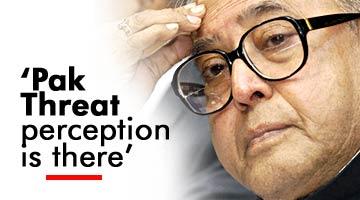
Home > News > Interview
The Rediff Interview/Defence Minister Pranab Mukherjee
March 15, 2005

Defence Minister Pranab Mukherjee was in Mumbai over the weekend to deliver a lecture on the role of the corporate sector in India's defence organised by the Observer Research Foundation. In a brief interview, he told Senior Editor Ramananda Sengupta that while attempts are on to improve relations with Pakistan, the "threat perception is very much there." How has our defence relationship with the US changed since 9/11? So far as our relationship with the US is concerned, you know that after the second Pokhran explosion, the US, as per their national law, immediately imposed sanctions on us. That caused some problems because for some of our projects, specially DRDO (Defence Research and Development Organisation) projects, we were depending on supplies from the US. As a result of the sanctions, naturally we could not get those equipment and material, and we had to outsource it from other places, which caused delays in our projects. This is one impact, but after that, now that sanctions have been lifted substantially, there is a joint group at the level of the defence secretary which regularly discusses overall strategy and policies, but mainly at the policy level. We have joint exercises, but so far as equipment is concerned, we did not have any major procurement of machines and equipment from US. Now some talks are also going on. During the last air show at Bangalore, some of the leading US companies came, they had interactions with the Indian industry and with representatives of the government...but these are at the discussion stages right now. So has there been a dramatic shift in our relationship with the US? I would not use the word dramatic, but there have been some positive improvements. But our relationship is improving. Indo US tech group to hold talks What about our defence relationship with China? We do not have any major defence cooperation with them. We don't supply any equipment to them nor do they supply anything to us. But the relationship between the two counties on the political front and even on the border are improving substantially. Confidence building measures taken by the armed forces of both sides are paying good dividends, and there have not been any major problems along the border and along the Line of Control. There might have been occasional transgressions, but those are minor events, and whenever such things happen, they have been sorted out at the level of the commanders at the ground level. What are your perceptions vis-�-vis Bangladesh? In respect of Bangladesh, we have a long porous border. Infiltration is taking place very regularly, illegal migrants are coming in. These infiltrators are not extremists or terrorists, but they are illegal migrants. A good number of illegal migrants have come into the country regularly from Bangladesh. In addition to that, we have positive information that some of the insurgent groups that are carrying out their activities in northeastern India including ULFA and some other insurgents outfits, they are operating from Bangladesh. Some of them have been detained. We have positive information and we are requesting the Bangladesh government to take steps so that their land is not used to carry out insurgent activities against India, specially the northeastern parts. However, there has not been any major progress in this respect and we are trying to resolve this issue through dialogue between our two nations. India, Bangladesh trade fire on border What is your view on the India-Pakistan relationship right now? We are engaged in a composite dialogue with Pakistan, and some high level visits have taken place. We also had some discussion after a long gap on Siachen. The talks are being carried out in a cordial atmosphere, and they are progressing. The recent developments after the visit of our foreign minister to Pakistan, and the decision to open the bus route from Srinagar [Images] to Muzafarrabad is a very positive development. After the ceasefire between the two nations in November 2003, there have been some occasions where exchange of fire has taken place, but I must say that Pakistani authorities have made it quite clear they do not want to disturb the ceasefire. There were three or four occasions very recently. We did not respond, but some firing took place from the other side of the border. These may be terrorist activities but Pakistani authorities say their armed forces are not involved. I can't say there has been any major breakthrough, but surely the situation has improved substantially, in our talks, and we have also shown restraint. When the number of infiltrators came down, we reduced the number of army personnel in the state of Jammu and Kashmir [Images]. We have completed the fencing along the LoC, and we are vigilant. As a result and consequence of that, some of the infiltration has come down, but the infrastructure which is available on the other side of the border for terrorist operations, including the launching pads and infiltrations points, that infrastructure is not yet demolished. We have requested Pakistan to stick to their president's word that the land of Pakistan will not be allowed to be used against India by any terrorist group. But it is still being used so we have drawn his attention to that. India-Pakistan peace talks: complete coverage What about the threat perception from Pakistan? The threat perception is there. We cannot forget what happened in the past, and there is no room for complacency. We are engaged in some sort of proxy war for more than 15 years. 35,000 civilians have been killed by terrorists, that is not a joke, it is matter for serious concern. Therefore, in that atmosphere, we are vigilant, we are trying to improve the situation, but at the same time the proxy war is going on. We cannot ignore that fact. Photograph: STR/AFP/Getty Images | Image: Uday Kuckian
The Rediff Interviews

|